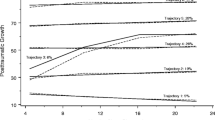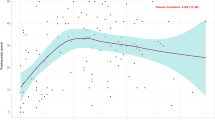Abstract
This study evaluated the prevalence and predictors of long term posttraumatic growth (PTG) after breast cancer, and relationships of PTG with psychological health in a random sample of 307 currently disease-free women 5–15 years after diagnosis. This cross-sectional study reveals long term posttraumatic growth scores comparable to those found in shorter term studies. Prevalence of a better appreciation of life is especially noteworthy. With the exception of perceived current sequelae of disease associated in a somewhat curvilinear fashion with PTG, demographic and medical variables are poor predictors of the issue. On the contrary, dispositional positive affectivity and adaptative coping of positive, active, relational, religious and to some extent denial coping have a strong effect on growth. Finally, PTG is slightly associated with mental quality of life and happiness. Findings are discussed in the light of posttraumatic growth theory.
Similar content being viewed by others
References
Abraido-Lanza, A. F., Guier, C., & Colon, R. M. (1998). Psychological thriving among Latinas with chronic illness. Journal of Social Issues, 54, 405–424.
Affleck, G., & Tennen, H. (1996). Construing benefits from adversity: Adaptational significance and dispositional underpinnings. Journal of Personality, 64, 899–922.
Armeli, S., Gunthert, K. C., & Cohen, L. H. (2001). Stressor appraisals, coping, and post-event outcomes: The dimensionality and antecedents of stress-related growth. Journal of Social and Clinical Psychology, 20, 366–395.
Avis, N. E., Smith, K. W., McGraw, S., Smith, R. G., Petronis, W. M., & Carver, C. S. (2005). Assessing quality of life in adult cancer survivors (QLACS). Quality of Life Research, 14, 1007–1023.
Bellizzi, K. M., & Blank, T. O. (2006). Predicting posttraumatic growth in breast cancer survivors. Health Psychology, 25, 47–56.
Bower, J. E., Meyerowitz, B. E., Desmond, K. A., Bernaards, C. A., Rowland, J. H., & Ganz, P. A. (2005). Perceptions of positive meaning and vulnerability following breast cancer: Predictors and outcomes among long-term breast cancer survivors. Annals of Behavioral Medicine, 29, 236–245.
Calhoun, L. G., & Tedeschi, R. G. (2006). The foundations of posttraumatic growth: An expanded framework. In L. G. Calhoun & R. G. Tedeschi (Eds.), Handbook of posttraumatic growth (Chap. 1, pp. 3–23). NY: Lawrence Erlbaum Associates.
Carver, C. S. (1997). You want to measure coping but your protocol’s too long: Consider the Brief Cope. International Journal of Behavioral Medicine, 4, 92–100.
Carver, C. S., Smith, R. G., Petronis, V. M., & Antoni, M. H. (2006). Quality of life among long-term survivors of breast cancer: Different types of antecedents predict different classes of outcomes. Psycho-Oncology, 15, 749–758.
Casso, D., Buist, D. S. M., & Taplin, S. (2004). Quality of life of 5–10 year breast cancer survivors diagnosed between age 40 and 49. Health and Quality of Life Outcomes, 2, 1–25.
Cordova, M. J., Cunningham, L. L. C., Carlson, C. R., & Andrykowski, M. A. (2001). Posttraumatic growth following breast cancer: A controlled comparison study. Health Psychology, 20, 176–185.
Cordova, M. J., Giese-Davis, J., Golant, M., Kronenwetter, C., Chang, V., & Spiegel, V. (2007). Breast cancer as trauma: Posttraumatic stress and posttraumatic growth. Journal of Clinical Psychology in Medical Settings, 14, 308–319.
Costello, A. B., & Osborne, J. W. (2005). Best practices in exploratory factor analysis: Four recommendations for getting the most from your analysis. Practical Assessment, Research & Evaluation, 10. Retrieved July 3, 2009 from http://pareonline.net/pdf/v10n7a.pdf.
Ganz, P. A., Rowland, J. H., Desmond, K. A., Meyerowitz, B. E., & Wyatt, G. E. (1998). Life after breast cancer: Understanding women’s health-related quality of life and sexual functioning. Journal of Clinical Oncology, 16, 501–514.
Harper, F. W. K., Schmidt, J. E., Beacham, A. O., Salsman, J. M., Averill, A. J., Graves, K. D., et al. (2007). The role of social cognitive porcessing theory and optimism in positive psychosocial and physical behavior change after cancer diagnosis and treatment. Psycho-Oncology, 16, 79–91.
Helgeson, V. S. (2005). Recent advances in psychosocial oncology. Journal of Consulting and Clinical Psychology, 73, 268–271.
Helgeson, V. S., Kerry, A. R., & Tomich, P. L. (2006). A meta-analytic review of benefit finding and growth. Journal of Consulting and Clinical Psychology, 74, 797–816.
Helgeson, V. S., Snyder, P., & Seltman, H. (2004). Psychological and physical adjustment to breast cancer over 4 years: Identifying distinct trajectories of change. Health Psychology, 23, 3–15.
Ho, S. M. Y., Chan, C. S. W., & Ho, R. T. H. (2004). Posttraumatic growth in Chinese cancer survivors. Psycho-Oncology, 13, 377–389.
Istituto Superiore di Sanità, Centro Nazionale di Epidemiologia, & Istituto Nazionale per la cura e lo studio dei Tumori. (2009). The EUROCARE-4 database on cancer survival in Europe. Retrieved June 28, 2009, from http://www.eurocare.it/Results/tabid/79/Default.aspx#longsurv0002.
Karanci, A. N., & Erkam, A. (2007). Variables related to stress-related growth among Turkish breast cancer patients. Stress and Health: Journal of the International Society for the Investigation of Stress, 23, 315–322.
Lechner, S. C., Carver, C. S., Antoni, M. H., Weaver, K. E., & Phillips, K. M. (2006). Curvilinear associations between benefit finding and psychosocial adjustment to breast cancer. Journal of Consulting and Clinical Psychology, 74, 828–840.
Lechner, S. C., Zakowski, S. G., Antoni, M. H., Greenhawt, M., Block, K., & Block, P. (2003). Do sociodemographic and disease-related variables influence benefit-finding in cancer patients? Psycho-Oncology, 12, 491–499.
Leplège, A., Ecosse, E., Pouchot, J., Coste, J., & Perneger, T. (2001). Le questionnaire SF-36. Manuel de l’utilisateur et guide d’interprétation des scores. Paris: Première Edition.
Linley, P. A., & Joseph, S. (2004). Positive change following trauma and adversity: A review. Journal of Traumatic Stress, 17, 11–21.
McFarland, C., & Alvaro, C. (2000). The impact of motivation on temporal comparisons: Coping with traumatic events by perceiving personal growth. Journal of Personality and Social Psychology, 79, 327–343.
Mols, F., Vingerhoets, Ad. J. J. M., Coebergh, J. W., & van de Poll-Franse, L. V. (2005). Quality of life among long-term breast cancer survivors: A systematic review. European Journal of Cancer, 41, 2613–2619.
Mols, F., Vingerhoets, Ad. J. J. M., Coebergh, J. W., & van de Poll-Franse, L. V. (2009). Well-being, posttraumatic growth and benefit finding in long-term breast cancer survivors. Psychology and Health, 24, 583–595.
Morrill, E. F., Brewer, N. T., O’Neill, S. C., Lillie, S. E., Claire Dees, E., Carey, L. A., et al. (2008). The interaction of post-traumatic growth and post-traumatic stress symptoms in predicting depressive symptoms and quality of life. Psycho-Oncology, 17, 948–953.
Park, C. L. (2004). The notion of growth following stressful life experiences: Problems and prospects. Psychological Inquiry, 15, 69–76.
Park, C. L., Cohen, L. H., & Murch, R. L. (1996). Assessment and prediction of stress-related growth. Journal of Personality, 64, 71–105.
Park, C. L., & Fenster, J. R. (2004). Stress-related growth: Predictors of occurrence and correlates with psychological adjustment. Journal of Social and Clinical Psychology, 23, 195–215.
Porter, L. S., Clayton, M. F., Belyea, M., Mishel, M., Gil, K. M., & Germino, B. (2006). Predicting negative mood state and personal growth in African American and white long-term breast cancer survivors. Annals of Behavioral Medicine, 31, 195–204.
Preacher, K. J., & MacCallum, R. C. (2003). Repairing Tom Swift’s electric factor analysis machine. Understanding Statistics, 2, 13–43.
Rabe, S., Zöllner, T., Maercker, A., & Karl, A. (2006). Neural correlates of posttraumatic growth after severe motor vehicle accident. Journal of Consulting and Clinical Psychology, 74, 880–886.
Ross, M. (1989). Relation of implicit theories to the construction of personal histories. Psychological Review, 96, 341–357.
Salsman, J. M., Segerstrom, S. C., Brechting, E. H., Carlson, C. R., & Andryowski, M. A. (2008). Posttraumatic growth and PTSD symptomatology among colorectal cancer survivors: A 3 month longitudinal examination of cognitive processing. Psycho-Oncology, 18, 30–41.
Schroevers, M. J., Ranchor, A. V., & Sanderman, R. (2006). Adjustment to cancer in the 8 years following diagnosis: A longitudinal study comparing cancer survivors with healthy individuals. Social Science and Medicine, 63, 598–610.
Schroevers, M. J., & Teo, I. (2008). The report of posttraumatic growth in Malaysian cancer patients: Relationships with psychological distress and coping strategies. Psycho-Oncology, 17, 1239–1246.
Schulz, T., & Mohamed, N. E. (2004). Turning the tide: Benefit finding after cancer surgery. Social Science and Medecine, 59, 653–662.
Sears, S. R., Stanton, A. L., & Danoff-Burg, S. (2003). The yellow brick road and the emerald city: Benefit finding, positive reappraisal coping and posttraumatic growth in women with early-stage breast cancer. Health Psychology, 22, 487–497.
Stein, K. D., Syrjala, K. L., & Andrykowski, M. A. (2008). Physical and psychological long-term and late effects of cancer. Cancer Supplement, 112, 2577–2592.
Taylor, S. E., Lichtman, R. R., & Wood, J. V. (1984). Attributions, beliefs about control, and adjustment to breast cancer. Journal of Personality and Social Psychology, 46, 489–502.
Tedeschi, R. G., & Calhoun, L. G. (1996). The Posttraumatic Growth Inventory: Measuring the positive legacy of trauma. Journal of Traumatic Stress, 9, 455–471.
Tomich, P. L., & Helgeson, V. S. (2002). Five years later: A cross-sectional comparison of breast cancer survivors with healthy women. Psycho-Oncology, 11, 154–169.
Tomich, P. L., & Helgeson, V. S. (2004). Is finding something good in the bad always good? Benefit finding among women with breast cancer. Health Psychology, 23, 16–23.
Tomich, P. L., Helgeson, V. S., & Vache, E. J. N. (2005). Perceived growth and decline following breast cancer: A comparison to age-matched controls 5-years later. Psycho-Oncology, 14, 1018–1029.
Urcuyo, K. R., Boyers, A. E., Carver, C. S., & Antoni, M. H. (2005). Finding benefit in breast cancer: Relations with personality, coping, and concurrent well-being. Psychology and Health, 20, 175–192.
Watson, D., Clark, L. A., & Tellegen, A. (1988). Development and validation of brief measures of positive and negative affect: The PANAS scales. Journal of Personality and Social Psychology, 54, 1063–1070.
Weiss, T. (2002). Posttraumatic growth in women with breast cancer and their husbands: An intersubjective validation study. Journal of Psychosocial Oncology, 20, 65–80.
Weiss, T. (2004). Correlates of posttraumatic growth in married breast cancer survivors. Journal of Social and Clinical Psychology, 23, 733–746.
Acknowledgements
The authors would like to extend their sincere thanks to the women who agreed to take part in the study. They would also like to thank the Ligue Nationale contre le Cancer (French Cancer League) for its financial support, along with Doctors François Dravet and François Pein at the Cancer Treatment and Research Center of Saint-Herblain for their time and their help.
Author information
Authors and Affiliations
Corresponding author
Rights and permissions
About this article
Cite this article
Lelorain, S., Bonnaud-Antignac, A. & Florin, A. Long Term Posttraumatic Growth After Breast Cancer: Prevalence, Predictors and Relationships with Psychological Health. J Clin Psychol Med Settings 17, 14–22 (2010). https://doi.org/10.1007/s10880-009-9183-6
Published:
Issue Date:
DOI: https://doi.org/10.1007/s10880-009-9183-6




